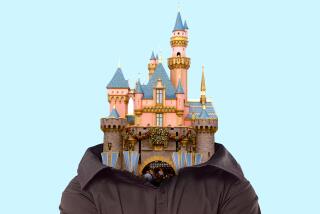Holy Land Theme Park Opens the Gates to Controversy
ORLANDO, Fla. — At the world’s largest model of the ancient city of Jerusalem, a man is explaining to the crowd of mostly gray-haired tourists the massive dimensions of the altar of sacrifice. Outside, two women tiptoe reverently into a replica of Christ’s tomb. In the Oasis Palms Cafe, a family orders Goliath Burgers.
Welcome to the Holy Land Experience, the newest and most controversial addition to this amusement park capital. Billed as “a living biblical museum” by its creator, Marvin Rosenthal, a Jew who became a Baptist minister, it has come under fire in its opening days as some rabbis and Jewish groups have questioned Rosenthal’s motives. Some have accused him of wanting to convert Jews to Christianity, of promoting a form of soul-snatching.
Rosenthal denies any such intentions.
“If you were to ask me, ‘Would you be pleased if Jewish people came, and Jewish people examined the claims of Christ,’ you bet we would be thrilled,” said Rosenthal, 65. “We are a Bible-teaching ministry that believes Jesus is the son of God, and he died for all men. But to suggest that we are targeting Jewish people or stealing Jewish souls is simply a fallacious statement.”
There are no rides at the Holy Land Experience, off busy Interstate 4 in a prime spot between Walt Disney World and Universal Studios. Instead, visitors to the $16-million park do a lot of walking--past the Jerusalem City Gate, through the Jerusalem Street Market and on to the Old Scroll Shop (where menorahs and shofars, traditional symbols of Judaism, are sold). Admission is $17 for adults; $12 for children under 12.
“I think it’s a horrible example of an outrageous attack on my religion,” said Irv Rubin of the militant Los Angeles-based Jewish Defense League, who showed up to protest outside the park on opening day, Feb. 5. “It’s deceptive. [Rosenthal] takes themes from Judaism--Jewish prayers, venerated Jewish objects--and tries to pass them off as Christian.
“This is not a Jewish-understanding experience. This has as its one goal to proselytize the Jews,” Rubin said.
Rubin acknowledged, however, that most of the couple of thousand visitors a day have been older Christians. Rosenthal estimated that only a handful of Jews have walked down his replica of the Via Dolorosa, the path Jesus took to die on the cross at Calvary.
Most tourists have had more in common with retired hairdresser Eleanor Petrie of Winter Park and her husband, John, a retired engineer, who describe themselves as nondenominational Christians.
“We’ve served him all our lives,” said Eleanor, 79. They enjoyed the park’s “peaceful” atmosphere so much that they bought annual “Jerusalem Gold” passes for $59 each, she said. “I feel like Jesus is right here with me.”
Park employees in sand-colored headdresses and robes mingled among the tourists. All 125 of them have signed statements affirming they are Christians, Rosenthal said. On the steps of the six-story, white-and-gold Herod’s Temple, costumed actors sang their way through a Bible story. In the adjoining theater, Adam and Eve ran through the jungle, terrified, as thundering music played in “Seed of Promise,” a movie made by Rosenthal’s ministry.
The Holy Land Experience had been a dream project for 25 years, Rosenthal said. Growing up in Philadelphia, the grandson of Orthodox Jews and son of conservative Jews, Rosenthal said he began to question his faith while studying the Bible as a teenager.
“I became convinced that if I believed Moses and the prophets of Israel in the Old Testament--that they said when the Messiah would come and where he would come and why he would come and what he would do when he came--then I would have to accept Christ as my savior,” Rosenthal said.
Later, he said, he “rebelled” for a while from his new religious choice, joining the Marine Corps and teaching ballroom dancing before entering a Bible college, then serving as pastor of a Baptist church in New Jersey for six years. Eleven years ago, he and his wife, Marbeth, moved to the Orlando area to begin their Zion’s Hope ministry.
“If you were to go through America today, you would find there are quite literally tens of thousands of churches that teach and preach exactly what we do,” he said. “The difference is that I’m Jewish, and I believe I’m still Jewish. If I had to call myself anything, I would say I’m a Hebrew Christian.”
Over the years, Rosenthal said, he had led more than 75 teaching tours of Israel and often thought, “Wouldn’t it be wonderful if we could bring a little of that to America?”
He said the $1-million property, with its tourist-perfect location, became available after a development company went bankrupt; it was paid for by “a Christian friend who was a businessman.”
The park, which he describes as nonprofit, was financed through the sale of four acres to the state for a highway-access ramp as well as “some Christian foundations who gave some very generous gifts, some board members who are very successful businessmen, and then the bank has a little bit of the mortgage as well.”
More to Read
Sign up for The Wild
We’ll help you find the best places to hike, bike and run, as well as the perfect silent spots for meditation and yoga.
You may occasionally receive promotional content from the Los Angeles Times.






